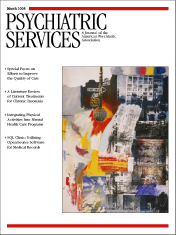To the Editor: The Substance Abuse and Mental Health Services Administration (SAMHSA) recently highlighted programs that can best facilitate self-employment of psychiatric outpatients (
1). For example, the University of Montana's Rural Entrepreneurship and Self-Employment Design Project offers funding for new businesses, technical assistance, financial planning, and ongoing capital. A similar program, InCube, is peer-managed in New York City. However, programs such as these are not widely available. These programs require a high level of expertise and are extremely risky because the new businesses can fail (
1).
Microcredit can help overcome these challenges by pooling financial risk and expertise among psychiatric outpatients in self-help borrower groups. Literally "a small loan," microcredit provides persons who have low incomes with start-up funding for businesses to promote self-sufficiency. This strategy has been implemented widely in India to reduce welfare dependency (
2,
3). The mechanisms of microcredit are straightforward. Members of a borrower group make contributions to a collective savings account on a regular basis, for example, every week. Lenders then offer business loans against the savings at a ratio of at least one to one. In other words, the ability of the network to repay the debt of defaulting group members compensates for the personal lack of income, savings, or collateral that would ordinarily disqualify individuals for credit.
While mental health professionals attend to psychiatric needs, they can facilitate borrower groups, provide linkage to key personnel, and assist with psychological, social, and fiscal consequences of unsuccessful pursuits. Microcredit can be used to help outpatients with mental illness start small businesses, such as providing housekeeping, childcare, or painting services. Businesses can grow as recovery occurs, and higher-functioning individuals can pursue larger or more complicated plans. Successful entrepreneurs can train other group members, form new groups, locate other sources of investment capital, and gain access to mainstream credit after they have established sufficient savings.
Although not insurmountable, several potential challenges exist (
2,
3). State-provided financial incentives are needed to compensate for hesitancy to invest in what is seen as high-risk, low-return enterprises. Public support and private-sector contributions are therefore crucial. Furthermore, loan providers and recipients require training and oversight, because both parties can lose financial viability as a result of mismanagement and capital loss. Finally, loan processing requirements and time delays must be avoided, because lending institutions need to respond quickly to small-scale enterprises that rely on funds at critical junctures.
The strategy has potential. In addition to increasing income, life control, confidence, and self-esteem, microcredit can connect members of borrower groups who might otherwise experience a high degree of societal exclusion. For example, the social capital can be used to advocate collectively for enhanced housing or labor force participation. Ideologically, the strategy is timely in relation to SAMHSA priorities. Rather than relying on centralized (top-down) government welfare provision, microcredit emphasizes decentralized (grassroots or bottom-up) market economy intervention that enhances empowerment of people in mutual assistance networks.

